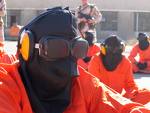Rosebud #283

Too little, too late?
Discussing new accusations against the media in the Scott McClellan book, more reporters, including Katie Couric and Jessica Yellin, have come out and admitted that they were bullied by the Pentagon and the corporations that owned their stations into being cheerleaders for the Iraq war (see today's New York Times article below). Well thanks for the soul-baring. This is what activists, and anybody else with common sense, have been saying for a long time: Most of the media is now owned by too few corporations, some with heavy interests in the military. Take GE, which owns NBC. GE is a major defense manufacturer. Wonder how much they've made off this illegitimate war. Try billions.
I wonder when reporters are going to confront the fact that they've still failed to ask the tough questions about 9/11 itself. 9/11—the justification for the Iraq and Afghanistan wars, Homeland Security, the Patriot Act, domestic spying, torture...for the world as we now know it. Despite its centrality to the political landscape, it's still untouchable, shrouded in myth and wrapped in the flag. If you question the official story, you're a lunatic—or worse, unpatriotic. Why not just look at the facts? See David Ray Griffin's new book, "9/11 Contradictions," for starters.
Was Press a War ‘Enabler’? 2 Offer a Nod From Inside
By BRIAN STELTER
In his new memoir, “What Happened,” Scott McClellan, the former White House press secretary, said the national news media neglected their watchdog role in the run-up to the invasion of Iraq, calling reporters “complicit enablers” of the Bush administration’s push for war.
Meredith Vieira on the “Today” program on NBC with Scott McClellan, who calls reporters “enablers” of the push for war.
Surprisingly, some prominent journalists have agreed.
Katie Couric, the anchor of “CBS Evening News,” said on Wednesday that she had felt pressure from government officials and corporate executives to cast the war in a positive light.
Speaking on “The Early Show” on CBS, Ms. Couric said the lack of skepticism shown by journalists about the Bush administration’s case for war amounted to “one of the most embarrassing chapters in American journalism.” She also said she sensed pressure from “the corporations who own where we work and from the government itself to really squash any kind of dissent or any kind of questioning of it.” At the time, Ms. Couric was a host of “Today” on NBC.
Another broadcast journalist also weighed in. Jessica Yellin, who worked for MSNBC in 2003 and now reports for CNN, said on Wednesday that journalists had been “under enormous pressure from corporate executives, frankly, to make sure that this was a war presented in a way that was consistent with the patriotic fever in the nation.”
On Thursday, she clarified her comments in a blog post, writing that her producers at MSNBC had wanted their coverage to reflect the patriotic mood of the country.
A spokeswoman for General Electric, which owns NBC and MSNBC through its division NBC Universal, declined to speak about the specifics of the comments but said, “General Electric has never, and will never, interfere in the editorial process at NBC News.”
The opinions of Ms. Couric and Ms. Yellin were hardly universal among journalists. Ms. Couric made her comments in an unusual on-camera tour of network morning programs — along with her two evening news competitors, Brian Williams of “NBC Nightly News” and Charles Gibson of “World News” on ABC — to promote a cancer research telethon.
“I think the questions were asked,” Mr. Gibson, who was a host of “Good Morning America” before the war began, said in response to Ms. Couric. “It was just a drumbeat of support from the administration. It is not our job to debate them. It is our job to ask the questions.”
Mr. Williams, who was an anchor on MSNBC at the time, emphasized the climate of “post-9/11 America.” In the early days of the war, he said, he would hear from the Pentagon “the minute they heard us report something they didn’t like.”
For five years, antiwar activists and media critics have claimed that the national news media failed to keep the White House accountable before the invasion. Andrew Heyward, who headed CBS News in 2003, said in an interview on Thursday that the trauma of the Sept. 11 attacks and the ensuing sense of patriotism might have muted press skepticism about the war.
Greg Mitchell, the author of “So Wrong for So Long,” a book about press and presidential failures on the war, argues that some media organizations have yet to come to terms with their role. Even at the fifth anniversary of the war last March, he said, “in the orgy of coverage of what had happened, there was almost no media self-assessment.”
NBC and CBS would not make executives available for interviews on the subject. Jon Banner, the executive producer of “World News” on ABC, said the news media should not be treated as a monolith.
“Were there questions we would have liked to ask?” Mr. Banner said. “Sure, but we were very critical of the administration and paid a significant price for it. It’s absurd and incorrect to lump us all together.”
<< Home